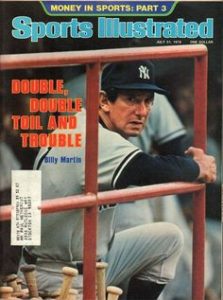I began inhaling Sports Illustrated cover-to-cover when I was 10 years old, after my dad hooked me up with a subscription for my historic double-digit birthday.
It was summer on the South Shore of Boston, my beloved Red Sox were miles ahead in the American League East, and the cover of my inaugural issue featured a photo of beleaguered Yankees manager Billy Martin and an allusion to a famous line from Shakespeare’s Macbeth (“Double, double, toil and trouble”) that went over my elementary-school-aged head.

I had seen the game that was the focal point of that cover story, as Martin yanked star outfielder Reggie Jackson from Fenway Park’s right field for failing to hustle. A heated tete-a-tete ensued in the dugout, the Sox went on to win, and all was right with the world.
Between that moment of getting SI delivered to my home set back in the woods off Webster Street and my development as a writer, there is one solid, bold-fonted line.
Four decades later, this vibrant account of last night’s Cubs vs. Dodgers game at Wrigley Field reminded me of a key element that drew me to journalism: the creative joy of drawing from an abundant supply of words and phrases, coupled with the challenge and reward of picking precisely the right one for the moment.
It’s what SI did more often than most, and it’s what I would find in the sports section of the Sunday edition of the Boston Globe that I would fight over (and play hide-and-seek with) my brother Andy.
It was a stroke of Alice in Wonderland-style hyperlink-clicking fate that I happened upon Los Angeles Times writer Jorge Castillo’s story. Some of his choices that resonate with my word- and phrase-wielding and story-telling soul:
“electric boom-or-bust slugging shortstop”
This one’s got a back-to-back batch of alliteration–and even casual readers ought to get the gist that I am a sucker for alliteration, especially when it is as aptly stated as that characterization of Chicago Cubs shortstop Javy Baez.
“provoking an exasperated response”
Granted, this is a “tell, don’t show” description of Dodgers pitcher Kenta Maeda. Did he flail his arms? Tilt his head up and gaze at the encroaching darkness? Stab at the ball with a flick of his wrist when the catcher tossed it back?
Castillo doesn’t say, and that’s OK with me. Every word, every piece of punctuation is a choice, with a constellation of factors at play. Very likely, he simply wanted to employ an economy of words to move on with the story of Maeda’s rough inning. So that’s just what he did, raising the literary bar in the process.
“in a jiffy”
When’s the last time I read this phrase in a newspaper story–or any story, for that matter? Have I ever seen it? Maybe a handful of times.
A few years ago, I made a conscious decision to revive “in a jiffy” in my everyday conversational repertoire, particularly around my teen-aged kids. I like how it sounds, how it makes me feel. Digging deep, I suppose it has something to do with my own sense of nostalgia, since the phrase hearkens back to my childhood, when the phrase seemed to be more frequently uttered.
That Castillo chose to sprinkle “in a jiffy” in this game story makes it something of a gift that I choose to make personal.
“display of agility”
This refers to Baez’s latest base-running caper. And although the scene could have been depicted in innumerable ways, this phrasing gets it just right. It was, after all, a display of agility.
“His contention didn’t produce a reversal.”
Having covered the civil and criminal courts for years, this brings to mind a legal argument. In the context of this story, it was Dodgers manager Dave Roberts arguing that Baez should be ruled out for running out of the baseline.
Castillo’s choice strikes me as a bit of tongue-in-cheek whimsy. We’re talking about a game of baseball, not a life-or-death issue. But, oh, how these trifling contests in the universe’s grand scheme can be treated as so exceedingly consequential.
The story runs 16 paragraphs; the highlights I have picked out are only in the first six. If you enjoy the art of writing, or baseball, or simply have time on your hands, I exhort you to read the entire piece before the link goes stale.
Notably, and perhaps not coincidentally, much of the delightful story’s early phraseology revolves around the colorful Baez. Castillo was equal to the task of capturing and conveying the action.
One might say that, in his story-telling, he was Baez-like. My whole point, though, is that there are countless other ways to describe it. That’s the challenge–always has been–and therein lies the reward.
Related Posts:
On the Heels of ‘Flight,’ Remembering My Encounter With Real-Life Hero Denny Fitch
Reunion with Fellow Beat Reporter Rekindles Wistful NU Bowl Game Coverage Hopes
A Tribute to Frank Deford, The Rare Hero Who Exceeded Expectations
